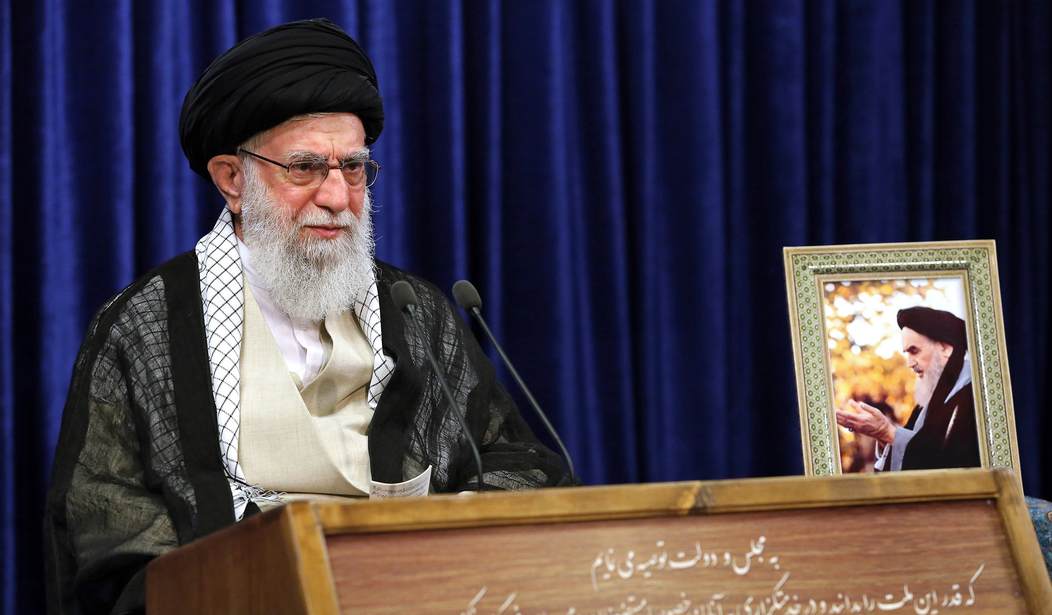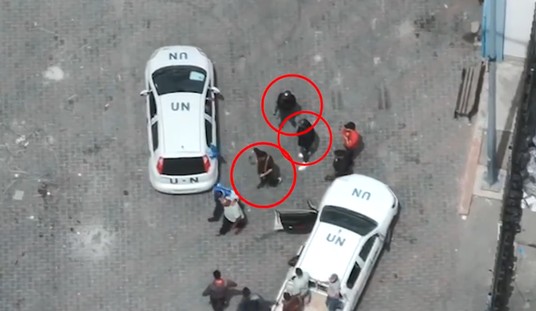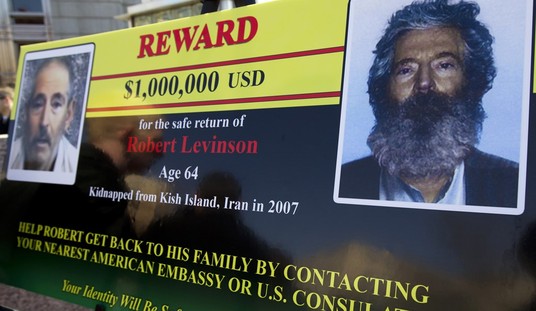It's been almost ten days now since Hamas's atrocious terror attack on Israel, and as we look deeper into the web of Middle Eastern politics, Iran is still present as the elephant in the room — despite their denial of any prior knowledge of this attack. But the evidence just keeps piling up.
Last weekend’s attack on Israel by Hamas has brought renewed scrutiny of the armed Palestinian group’s longstanding relationship with Iran, and questions about whether the Gaza-based group could have pulled off such a sophisticated and devastating operation on its own.
Iran has a long history of training and arming proxy militia groups in the region, from Gaza to Lebanon, Iraq and Syria. It supports Hamas militarily and has helped it design and produce a domestic missile and rocket system to match the capabilities and material available in Gaza — an impoverished, densely populated coastal strip that has been blockaded by Israel and Egypt for the past 16 years.
And over the past year, there have been signs that Iran and its proxies were preparing to take a more aggressive approach toward Israel.
Iran has made no bones about this over the years. And when a medieval theocracy like Iran says what it intends to do, the world needs to listen; the desire to destroy Israel is one of the few honest statements Iran has issued since the 1979 revolution.
The Islamic Republic's support for Hamas and Hezbollah, among other Islamic terror groups, is well-documented. And there have been meetings, it seems, as early as last March, that smells a lot like planning meetings for this operation. It's important to note, as well, the involvement of Hezbollah. On Twitter, Paul Cruickshank has the receipts:
New York Times: "Hassan Nasrallah, the leader of Hezbollah, held an hourslong online meeting in March with an elite group of strategists from all the Iran-backed militias and told them to get ready for a war with Israel with a scope and reach — including a ground invasion — that…
— Paul Cruickshank (@CruickshankPaul) October 13, 2023
So we have the guy in charge of Hezbollah talking to "strategists" who are coordinating Iran's "proxy" forces — that is, irregular forces funded and equipped by Iran, such as Hamas and other "militias" meeting with Hamas and Hezbollah leaders over the last year. Note also that the meeting included planning a ground invasion. Iran claims that the Hamas attack took them by surprise, but the timeline shows otherwise:
New York Times: "Some people familiar with the operation said that a tight circle of leaders from Iran, Hezbollah and Hamas helped plan the attack starting over a year ago, trained militants and had advanced knowledge of it."
— Paul Cruickshank (@CruickshankPaul) October 13, 2023
It's unclear who "some people" are, but here we see a link between Iran, Hamas, and Hezbollah — well before the latter two organizations' operation to tag-team Israel.
"In September, Israeli intelligence officials told The New York Times that they had intelligence suggesting Mr. Khamenei, Iran’s supreme leader, had ordered a wide campaign against Israel including targeting its citizens abroad, conducting sabotage inside its borders, and…
— Paul Cruickshank (@CruickshankPaul) October 13, 2023
Hamas has recently claimed Iran will be providing direct support, including placing missiles in areas where they may be employed to support Hamas operations. That's not an operation that can be carried out overnight; this requires staging vehicles and equipment, providing logistical support, and so on. If we are to believe, as Hamas claims, that the missiles have been placed — past tense — this was something that has been in the works for more than a few days. And Iran's leader, safely ensconced in Tehran, sent out an oblique message four days prior to the attack that, while not verified as such, could well have been a coded "Go" order.
"On Oct. 3, four days before Hamas launched its attack on southern Israel, Mr. Khamenei’s official account in Farsi posted a message on X, formerly known as Twitter, that said: “Israel will be gone.”"
— Paul Cruickshank (@CruickshankPaul) October 13, 2023
Read the full article here: https://t.co/06m6QBcwDk
Iran, of course, has been and will continue to claim surprise at the actions Hamas has taken on October 7th and since. But there is evidence of ongoing coordination since the attack, even down to providing actual military support, although there is some evidence that Iran is walking back that assertion. But a wider, regional war is not out of the question.
My analysis: This extraordinarily detailed new reporting from the New York Times indicates that we may be heading towards a regional war whose architects are Tehran and Hezbollah. With tensions escalating every minute, can the Middle East pull back from the brink?
— Paul Cruickshank (@CruickshankPaul) October 13, 2023
The presence of two U.S. aircraft carriers in the eastern Med may affect that calculation. Then again, it may not.
It's possible, of course, that Iran did not know the precise details — date, time, approach routes, and so on — of the Hamas assault into southern Israel. That yields them plausible deniability when the international community calls them out on their support for some of the worst atrocities the world has seen in decades. But Iran's support for Hamas, Hezbollah, and other Islamic terror groups is undeniable, and the lessening of sanctions on Iran by the Biden Administration has doubtless encouraged them — not to mention their (correct) assessment of the United States' current leadership as weak and ineffective.
The Middle East has been a powder keg throughout recorded history. Since 1948, the tiny state of Israel has contended with being surrounded by maniacs who want to wipe Israel off the map. And there will never be peace in that region unless Iran ceases its provoking and supporting terror groups.
Meanwhile, in Israel, the conflict rages on. See more at these links:
- Palestinian Authority Leader Abbas Briefly Disavows Hamas Terrorism and Then Thinks the Better of It
- WATCH: Israeli Navy Delivers Decisive Doom to Hamas' Attempt to Infiltrate by Sea
- WATCH: Hamas Terrorist's Bodycam Shows the Moment an Israeli Kibbutz Let Him Have It
- Hamas Stole Aid from the UN, and Now the UN Is Rushing to Cover It Up
- Iran Announces Hamas Willing to Release Hostages if Israel Halts Airstrikes
- Israeli Father Recounts the Moment He Learned His Young Daughter Was Killed by Hamas














Join the conversation as a VIP Member